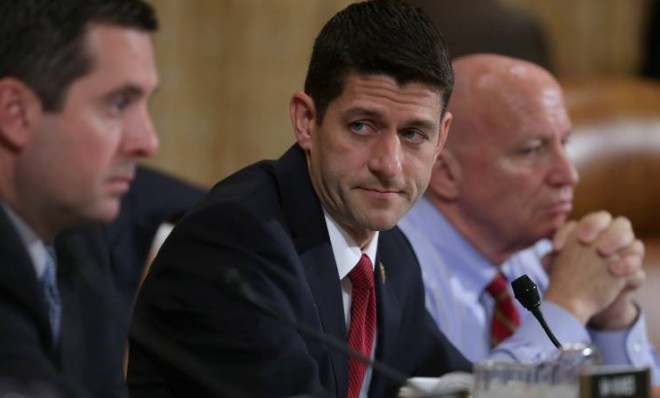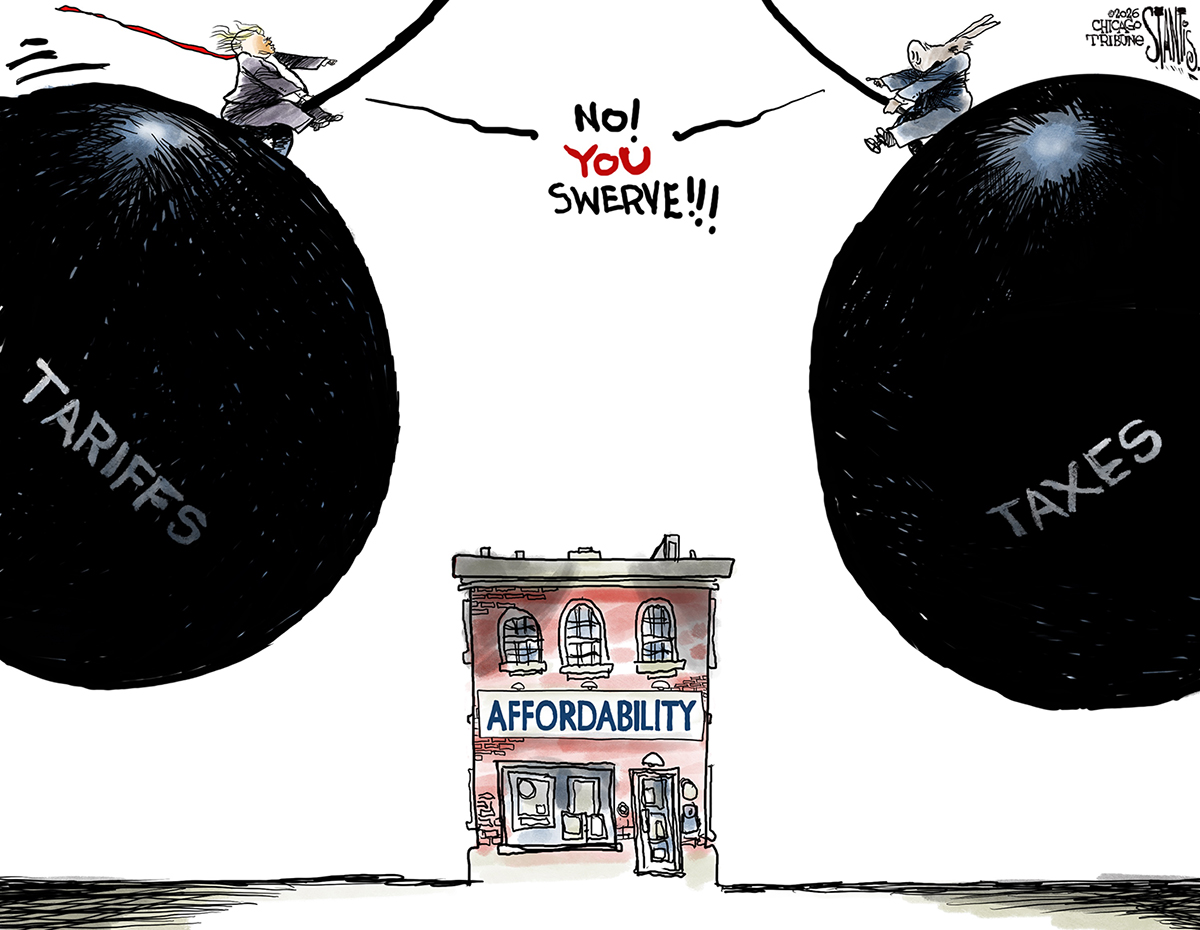How the GOP boxed itself in on a budget deal
Republicans can't even pass their own spending bills — will they finally compromise with Democrats?


Republican lawmakers have steadfastly refused to compromise with their Democratic counterparts on multiple spending bills since reclaiming the House in 2010.
That's how we ended up with the so-called sequester — the automatic, across-the-board budget cuts triggered when Congress failed to reach a budget deal — in the first place.
Lately, however, cracks have begun to emerge in the GOP's "no negotiations, period" tactic. And with another round of sequester cuts looming — including deep cuts to defense spending that the Pentagon has warned could be problematic for national security — Republicans may finally be feeling enough pressure to cave.
The Week
Escape your echo chamber. Get the facts behind the news, plus analysis from multiple perspectives.

Sign up for The Week's Free Newsletters
From our morning news briefing to a weekly Good News Newsletter, get the best of The Week delivered directly to your inbox.
From our morning news briefing to a weekly Good News Newsletter, get the best of The Week delivered directly to your inbox.
On Wednesday, the House pulled a housing and transportation spending bill from the floor for lack of votes, the latest in a string of legislative setbacks that is widely seen as a rolling embarrassment for the House Republican leadership, particularly Speaker John Boehner (Ohio). While seemingly minor, the failure underscored how difficult a time Republicans have had passing their own bills — which are designed to replace the sequester cuts with handpicked savings from elsewhere in the budget.
The GOP's failure to reach an intraparty consensus on Wednesday, on just one slice of the overall budget, spelled the "potential ruin of its entire posture toward Obama," wrote New York's Jonathan Chait.
Since the House Republican plan imposes all its austerity on a narrow slice of the budget — programs that are neither automatic income support, like Medicare or Social Security, nor defense — the cuts are extremely deep. So deep, it turns out, that many House Republicans themselves can't tolerate them.
Several things lent special significance to what would otherwise appear to be a tedious procedural snafu. First, the push-back occurred among the mainstream wing of the House GOP, which has until now dutifully obeyed its leadership, giving all the leverage to the party's radical wing. Second, House Republicans are not just complaining about the defense cuts but also the domestic spending levels — that is, they're objecting not only to the piece of sequestration that's supposed to be Obama's leverage over them, but also to the piece that's supposed to be their leverage over Obama. Third, and most significant, you have a House Republican openly subverting Boehner's no-negotiation approach. [New York Magazine]
Following the bill's failure, House Appropriations Committee Chairman Hal Rogers (R-Ky.) declared in a statement that "sequestration — and its unrealistic and ill-conceived discretionary cuts — must be brought to an end."
"The House, Senate, and White House must come together as soon as possible on a comprehensive compromise that repeals sequestration, takes the nation off this lurching path from fiscal crisis to fiscal crisis, reduces our deficits and debt, and provides a realistic top-line discretionary spending level to fund the government in a responsible — and attainable — way," he added.
A free daily email with the biggest news stories of the day – and the best features from TheWeek.com
The vote also has implications beyond the sequester, touching the very core of the Republican Party's platform when it comes to fiscal issues: The budget championed by Rep. Paul Ryan of Wisconsin. Republicans have essentially been holding votes that would theoretically implement the painful cuts contained in Ryan's budget, but as Wednesday's failed vote showed, Republicans couldn't stomach passing them.
Here's Talking Points Memo's Brian Beutler on that point:
Republicans don't control government. But ahead of the deadline for funding it, their plan was to proceed as if the Ryan budget was binding, and pass spending bills to actualize it — to stake out a bargaining position with the Senate at the right-most end of the possible.
But they can't do it. It turns out that when you draft bills enumerating all the specific cuts required to comply with the budget's parameters, they don't come anywhere close to having enough political support to pass. Even in the GOP House. Slash community development block grants by 50 percent, and you don't just lose the Democrats, you lose a lot of Republicans who care about their districts. Combine that with nihilist defectors who won't vote for any appropriations unless they force the president to sign an Obamacare repeal bill at a bonfire ceremony on the House floor, and suddenly you're nowhere near 218. [TPM]
That leaves Republicans with two options: Work with Democrats, or let the sequester bite deeper and hope the political fallout isn't too bad.
For Republican leaders to whip the rank and file into accepting a deal — and perhaps a highly unfavorable one, from their perspective — will be no easy task given how deeply divided the party has become. A Pew survey this week showed that vocal chunks of the party actually wanted the GOP to move further to the right on a host of issues, and that the Tea Party, for all the stories about its imminent death, still held an outsize influence on the party's politics. Further, it found that 67 percent of GOP voters thought the party had already compromised enough or too much with Democrats.
Still, as the latest failure in the House showed, Republicans are at the very least warming to the idea of compromise. Whether Congress can actually hammer one out is another story entirely.
Jon Terbush is an associate editor at TheWeek.com covering politics, sports, and other things he finds interesting. He has previously written for Talking Points Memo, Raw Story, and Business Insider.
-
 Political cartoons for January 18
Political cartoons for January 18Cartoons Sunday’s political cartoons include cost of living, endless supply of greed, and more
-
 Exploring ancient forests on three continents
Exploring ancient forests on three continentsThe Week Recommends Reconnecting with historic nature across the world
-
 The rise of the spymaster: a ‘tectonic shift’ in Ukraine’s politics
The rise of the spymaster: a ‘tectonic shift’ in Ukraine’s politicsIn the Spotlight President Zelenskyy’s new chief of staff, former head of military intelligence Kyrylo Budanov, is widely viewed as a potential successor
-
 The billionaires’ wealth tax: a catastrophe for California?
The billionaires’ wealth tax: a catastrophe for California?Talking Point Peter Thiel and Larry Page preparing to change state residency
-
 Bari Weiss’ ‘60 Minutes’ scandal is about more than one report
Bari Weiss’ ‘60 Minutes’ scandal is about more than one reportIN THE SPOTLIGHT By blocking an approved segment on a controversial prison holding US deportees in El Salvador, the editor-in-chief of CBS News has become the main story
-
 Has Zohran Mamdani shown the Democrats how to win again?
Has Zohran Mamdani shown the Democrats how to win again?Today’s Big Question New York City mayoral election touted as victory for left-wing populists but moderate centrist wins elsewhere present more complex path for Democratic Party
-
 Millions turn out for anti-Trump ‘No Kings’ rallies
Millions turn out for anti-Trump ‘No Kings’ ralliesSpeed Read An estimated 7 million people participated, 2 million more than at the first ‘No Kings’ protest in June
-
 Ghislaine Maxwell: angling for a Trump pardon
Ghislaine Maxwell: angling for a Trump pardonTalking Point Convicted sex trafficker's testimony could shed new light on president's links to Jeffrey Epstein
-
 The last words and final moments of 40 presidents
The last words and final moments of 40 presidentsThe Explainer Some are eloquent quotes worthy of the holders of the highest office in the nation, and others... aren't
-
 The JFK files: the truth at last?
The JFK files: the truth at last?In The Spotlight More than 64,000 previously classified documents relating the 1963 assassination of John F. Kennedy have been released by the Trump administration
-
 'Seriously, not literally': how should the world take Donald Trump?
'Seriously, not literally': how should the world take Donald Trump?Today's big question White House rhetoric and reality look likely to become increasingly blurred
